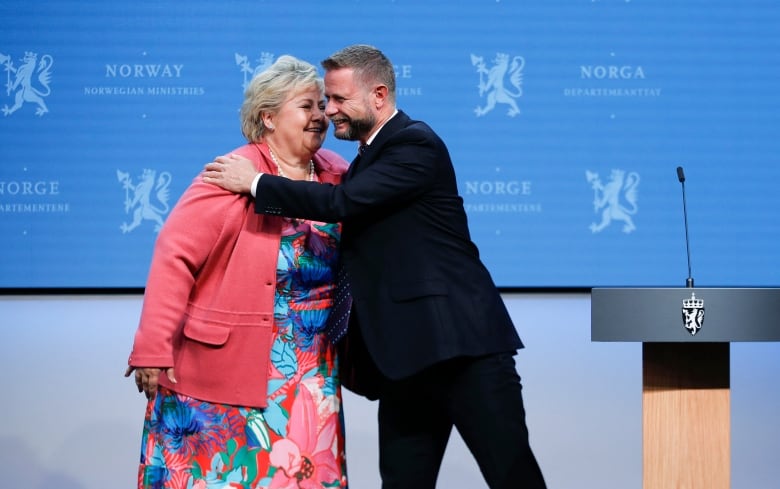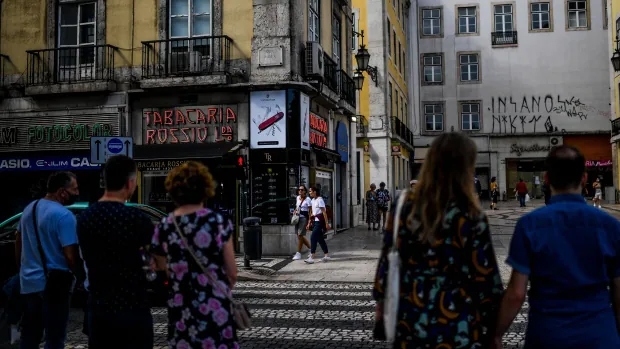Portugal is scrapping many of its remaining COVID-19 restrictions, after becoming the world leader in vaccination rollout — though the prime minister cautioned that the pandemic isn’t over and “the risk is still there.”
The latest:
- U.S. CDC director overrules advisory panel, paving way for wider use of COVID-19 vaccine boosters.
- Alberta sees record number of ICU admissions as COVID-19 hospitalizations soar.
- ‘I feel more like a bouncer than a hostess’: Front-line workers shoulder burden of vaccine mandates.
- Ontario sees 727 new COVID-19 cases, most vaccinations in more than a month.
- Track how many people have been given a COVID-19 vaccine across Canada.
Portugal is scrapping many of its remaining COVID-19 restrictions, after becoming the world leader in vaccination rollout. The country has fully vaccinated nearly 85 per cent of the population, according to Our World in Data.
The government says starting Oct. 1, it will remove limits on how many people can be in cafés and restaurants, at weddings and baptisms, shopping malls, concerts and cinemas. Bars and discos will reopen, although only for vaccinated people and people with negative coronavirus tests.
Prime Minister Antonio Costa said some restrictions need to stay in place. The wearing of face masks will still be mandatory on public transportation, and in hospitals, care homes and shopping malls. People arriving from abroad by air or sea must still show a vaccine certificate or a negative virus test.
“The pandemic isn’t over,” he said. “The risk is still there.”
Restrictions are also being lifted in Norway.
The country will reopen society on Saturday, the government said on Friday, ending pandemic-curbing restrictions that have limited social interaction and hobbled many businesses.
“It is 561 days since we introduced the toughest measures in Norway in peacetime…. Now the time has come to return to a normal daily life,” Prime Minister Erna Solberg told a news conference.

The decision to no longer require physical distancing will allow culture and sports venues to utilize their full capacity, rather than just a portion of seats, while restaurants can fill up and nightclubs reopen.
Solberg had so far implemented the first three stages of a four-step plan to remove social and economic restrictions imposed since March of last year, but the final step was postponed several times amid worries over infection rates.
Some 76 per cent of all Norwegians have now received at least one dose of a COVID-19 vaccine, while 67 per cent of the population is fully vaccinated, according to the Institute of Public Health.
“Handshakes will again be allowed,” a smiling Health Minister Bent Hoeie said.
He stressed Norway will have “an increased preparedness” and local restrictions will be imposed if there was a flareup.
-From The Associated Press and Reuters, last updated at 12:35 p.m. ET
What’s happening across Canada
WATCH | Anesthesiologist Dr. Everett Zdrill of Edson, Alta., says the current wave of COVID-19 patients in the province is younger and becoming ‘sicker with COVID in numbers we’ve never seen before’:

Young COVID patients showing up confused, sweaty and grey, rural Alberta doctor says
Anesthesiologist Dr. Everett Zdrill of Edson, Alta., says the current wave of COVID-19 patients in the province is younger and becoming ‘sicker with COVID in numbers we’ve never seen before.’ (Credit: Alberta Health Services) 8:44
The head of Alberta’s health system said on Thursday that since Sunday, hospitals have admitted a daily average of two dozen or more critically ill COVID-19 patients.
Dr. Verna Yiu said the only way the health-care system has been able to keep pace with those numbers is because some ICU patients have died. Alberta normally has 173 ICU beds, but has doubled that number to 350 by taking over extra spaces and reassigning staff.
According to an update posted by Alberta Health Services on Thursday, 37 additional ICU surge spaces were added in the last seven days alone.
“There are currently 310 patients in ICU, the vast majority of whom are COVID positive,” the update said. “This is the highest number of ICU patients since the pandemic began.”
What’s happening around the world
As of early Friday morning, more than 230.6 million cases of COVID-19 had been reported worldwide, according to Johns Hopkins University’s case tracking tool, which collects data from around the world. The reported global death toll stood at more than 4.7 million.
In the Asia-Pacific region, South Korea has reported its biggest daily jump in coronavirus since the start of the pandemic as people returned from the country’s biggest holiday of the year.
The Korea Disease Control and Prevention Agency said more than 1,750 of the 2,434 new cases reported Friday were from the greater capital area, where officials have raised concern over an erosion in citizen vigilance despite the enforcement of the strongest physical distancing rules short of a lockdown since July.
In the Americas, a U.S. CDC advisory panel has recommended a booster shot of the Pfizer and BioNTech vaccine for Americans aged 65 and older and some adults with underlying medical conditions that put them at risk of severe disease.
- INTERACTIVE | Where is the coronavirus pandemic getting better or worse?
In Europe, coronavirus deaths in Russia hit a record on Friday amid a steady increase in infections.
Russia’s state coronavirus task force reported 828 new deaths on Friday, the country’s highest daily number of the pandemic. The previous record of 820 daily deaths was registered on Aug. 26, and on Thursday this week the daily death toll reached 820 once again.
In all, Russian authorities have reported some 7.3 million confirmed cases and over 202,000 deaths. However, reports by the government’s statistical service Rosstat that tally coronavirus-linked deaths retroactively reveal much higher mortality numbers.
In the Middle East, Yemen received its third batch of COVID-19 vaccines through the COVAX global vaccine-sharing scheme, the health ministry said
In Africa, Egypt has authorized Russia’s single-dose Sputnik Light vaccine against COVID-19, the Russian Direct Investment Fund, which markets the shot abroad, said on Friday. The country approved Russia’s two-dose Sputnik V vaccine in February.
-From The Associated Press and Reuters, last updated at 7:15 a.m. ET

